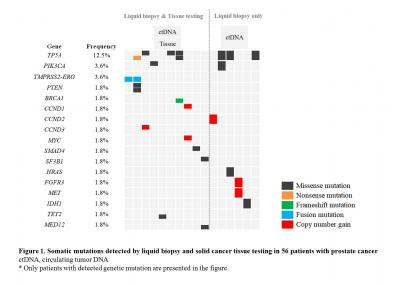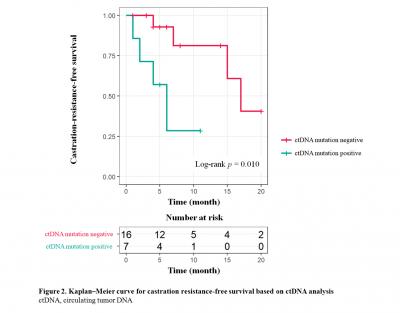|
Cancer - Prostate(구연)
|
(E-139)
|
|
|
액체 생검을 이용한 한국 전립선암 환자의 유전적 변이 프로파일: 거세 저항성 발생 예측에 있어 액체 생검의 유용성 |
| 성균관의대 삼성서울병원 비뇨의학교실¹, GC 녹십자 지놈², 중앙보훈병원 비뇨의학과³, 삼성서울병원 삼성생명과학연구소⁴, 숭실대학교 생명정보학과5 |
| 유지웅¹, 조은해², 최중원³, 임정은⁴, 이준남², 5, 강민용¹, 성현환¹, 정병창¹, 서성일¹, 전성수¹, 이현무¹, 전황균¹ |
Purpose
To investigate germline and somatic mutation profiles in Korean patients with prostate cancer using liquid biopsy and to evaluate the prognostic value of circulating tumor DNA (ctDNA) in predicting castration resistance in patients with metastatic hormone-sensitive prostate cancer (mHSPC).
Materials and Methods
Plasma samples from 56 prostate cancer patients were subjected to germline next-generation sequencing (NGS) and ctDNA somatic mutation analysis using liquid biopsy. Additionally, paired solid cancer tissues from 18 patients were subject to somatic NGS. The clinical parameters and ctDNA profiles of patients with mHSPC were analyzed to evaluate the prognostic value of ctDNA mutations with respect to predicting castration resistance using Kaplan‒Meier and Cox proportional hazards regression analyses.
Results
Germline mutations occurred in 3.6% of the patients in this cohort, with mutations identified in RAD50 (1.8%) and BRCA1 (1.8%). Somatic mutations were commonly detected in TP53 (12.5%), PIK3CA (3.6%), and TMPRSS2-ERG (3.6%)(Figure 1). Kaplan‒Meier analysis revealed that ctDNA mutations significantly reduced the castration resistance-free survival in mHSPC patients (p = 0.010)(Figure 2). The ctDNA mutations could independently predict the castration resistance development (hazard ratio 13.048; p = 0.041).
Conclusions
Korean patients with prostate cancer showed a relatively low germline mutation rate compared to other ethnicities. The ctDNA mutations detected by liquid biopsy can predict the development of castration resistance in patients with mHSPC. |
  |
|
keywords : prostatic neoplasms, circulating tumor DNA, castration resistance |
|

